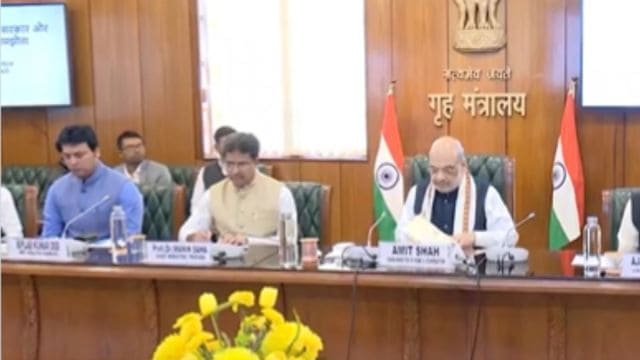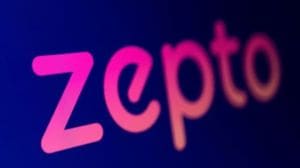Centre signs pact with Tripura govt, Tipra Motha for tribal rights
The agreement was signed in the presence of Union Home Minister Amit Shah and Tripura Chief Minister Manik Saha.
 Union Home Minister Amit Shah, Tripura CM Manik Saha, Tipra Motha supremo Pradyot Debbarma and other senior leaders hold a meeting in Delhi. (X/PTI)
Union Home Minister Amit Shah, Tripura CM Manik Saha, Tipra Motha supremo Pradyot Debbarma and other senior leaders hold a meeting in Delhi. (X/PTI)AHEAD OF the Lok Sabha elections, the Union government on Saturday signed a tripartite agreement with the Tripura government and The Indigenous Progressive Regional Alliance, popularly known as Tipra Motha, for a “time-bound” and “honourable” solution to “all issues” related to the state’s indigenous people.
“Under the pact, it was agreed to amicably resolve all issues of indigenous people of Tripura relating to history, land and political rights, economic development, identity, culture and language. Along with this, it was agreed to constitute a joint working group/ committee to work out and implement the mutually agreed points on all the above mentioned issues in a time-bound manner to ensure an honourable solution,” the Centre said in a statement.
“In order to maintain a conducive atmosphere for implementation of the pact, all stakeholders shall refrain from resorting to any form of protest/ agitation, starting from the day of signing of the agreement,” it added.
On February 27, Tipra Motha founder Pradyot Debbarma had started a “fast-unto-death” to demand a permanent solution to the problems of the indigenous people. Debbarma, who signed the tripartite agreement in New Delhi on behalf of his party, is scheduled to return to Tripura on Sunday, where he is expected to break his fast and officially call off his agitation.
The agreement was signed in the presence of Union Home Minister Amit Shah and Tripura Chief Minister Manik Saha.
“With the signing of the agreement, we have respected history, corrected the mistakes, and accepted the realities of the present day. No one can change history, we can always move forward by learning from mistakes and keeping in mind today’s realities,” Shah said.
Calling it a “historic day” for Tripura, Shah said: “With today’s agreement, Tripura has moved forward to become a dispute-free Tripura. I assure all stakeholders of Tripura that now, you do not have to struggle for your rights. The Government of India will come forward to develop a system which will protect the rights of all.”
He said the Tipra Motha as well as other tribal parties and organisations, along with the state government, had played a constructive role in working towards the agreement.
Citing several accords and agreements signed by the Centre, Shah said the Home Ministry, under the leadership of Prime Minister Narendra Modi, had worked towards achieving the vision of an insurgency-free, dispute-free and violence-free Northeast.
“I am confident that Tripura will join Modiji’s dream of ‘Viksit Bharat’… When we achieve ‘Viksit Bharat’, Tripura will go ahead with the rest of the country as ‘Viksit Tripura’,” he said.
In an interview to The Indian Express after signing the agreement, Debbarma said it was “the first step towards realisation of the aspirations of the indigenous people… a move towards the right direction.” Calling it an “acknowledgement by the Government of India of the historical injustice meted out to the indigenous people of Tripura”, he said “course correction” has to be done now.
The Tipra Motha’s demands include a “Greater Tipraland” — a separate state for Tripura’s tribals which seeks to include those living outside the Tripura Tribal Areas Autonomous District Council (TTAADC) area as well. The party has also sought more powers for the TTAADC – including direct funding from the Centre, its own police force, share of revenue from gas exploration in the state – and Roman script to be declared as the official script for the indigenous Kokborok language.
Meanwhile, speaking to reporters in Agartala in the evening, CM Saha said: “It is a historic day indeed… It is the need of the hour. In the present time, this accord is of great importance. We want peace to prevail in Tripura. We don’t want to stay in government by creating problems, instead by resolving crises.”
He said the joint working group would be set up soon, and its decisions would be implemented only after consulting all stakeholders. Saha, however, declined to comment on the time frame for the group to complete its task. “Since it’s being said to be time-bound, it will be done soon. We shall finish the entire process on time. But the exact date or time cannot be given,” he said.
Asked how the central and state governments would deal with two committees set up under two separate accords — a high-powered modality committee formed under the MHA in 2018, and the joint working group set up now – Saha said: “That one was signed earlier, so that one is there, but since this one is up to date, we have to stress on this”.
With ENS, New Delhit.







